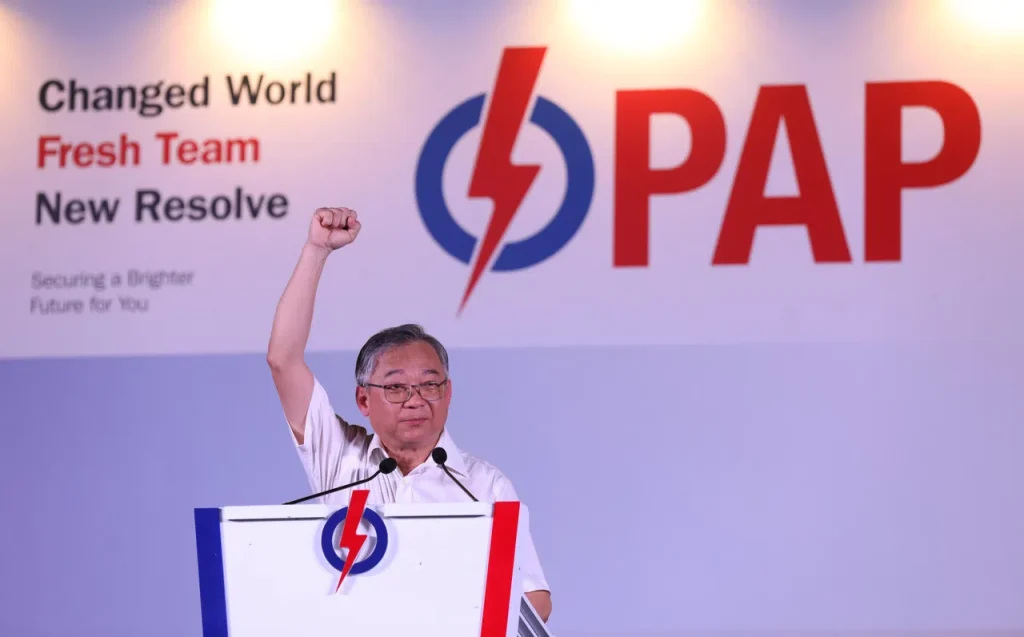[SINGAPORE] With global trade in upheaval, Singapore’s government needs a strong mandate to defend the country’s interests at the negotiating table, said People’s Action Party (PAP) candidates on Saturday (Apr 26) night.
Deputy Prime Minister Gan Kim Yong plays a crucial role in US tariff talks, and is “at the front line” of addressing economic turmoil, added Prime Minister Lawrence Wong and retiring Senior Minister Teo Chee Hean, in separate rallies.
At three rallies across the island, PAP candidates stressed the economic importance of a strong mandate, and warned that some opposition ideas may deter multinational corporations (MNCs).
At the rally for Chua Chu Kang GRC, Second Minister for Trade and Industry Tan See Leng said: “On the international front, many countries will look you in the eye and see if you flinch or don’t flinch. This is the art of negotiation.”
“Why we can do it well is because of the support of each and every one of you,” he said. “If you give me the mandate, I will never worry – when I go out and negotiate a deal, my back is supported by all of you.”
Fellow Chua Chu Kang candidate Jeffrey Siow made a similar point, saying: “This is serious. A storm is coming. And that is why your vote in this election matters so much.”
BT in your inbox

Start and end each day with the latest news stories and analyses delivered straight to your inbox.
Without a strong mandate, Singapore’s government may not be respected by leaders such as US President Donald Trump and Chinese President Xi Jinping, said Siow, formerly second permanent secretary for trade and industry as well as manpower.
At the rally for East Coast GRC, former minister Lim Swee Say similarly said a weak mandate would make it hard for the government “to negotiate, to bargain, to protect the interests of Singapore” on the international stage.
Anchoring MNCs
Beyond taking care of Singaporeans, the PAP government brings “the best companies in the world to anchor in Singapore”, said Dr Tan.
Staying open has strengthened Singapore’s competitiveness and created good jobs for Singaporeans, said PM Wong, as a guest speaker at the Chua Chu Kang rally.
If Singapore had done otherwise, “companies may get worried – and it is Singaporeans who suffer”, he said.
Referencing the Progress Singapore Party’s (PSP) call for tighter foreign labour policies, PM Wong said MNCs might be spooked if PSP candidates are elected into Parliament.
“Policies may start to change, and (MNCs) may decide to move out of Singapore. And if they do, who suffers in the end? It is Singaporeans,” he said.
Singapore’s small size means it cannot be insular, unlike countries such as the US, he added. Singapore would pay a huge price if it closed its doors, “especially at a time of great uncertainty and turbulence”.
At the East Coast rally, anchor minister Edwin Tong noted that many MNCs here are US companies, and Singapore will face “serious problems” if US tariffs make it hard for them to stay.
Citing a Workers’ Party (WP) proposal to tax MNCs more, he said: “This can raise revenue, but what will this do to MNCs?”
MNCs provide the majority of good-paying jobs for Singaporeans, and their departure would result in the loss of these, he said.
Known and trusted
PM Wong and SM Teo said that amid global uncertainty, DPM Gan is a key figure – leading tariff talks with the US, as well as heading Singapore’s task force to help businesses and workers cope.
In a last-minute swap on Nomination Day, DPM Gan left Chua Chu Kang GRC to head the PAP’s Punggol team against a WP slate of star newcomers.
PM Wong related how, in the midst of campaigning, DPM Gan had to take an important Zoom call with US Secretary of Commerce Howard Lutnick.
Though the US said that baseline tariffs will remain unchanged, DPM Gan had a “good discussion on how we can facilitate key exports”, said PM Wong.
“The Commerce Secretary agreed that the US will consider this and told Gan Kim Yong, ‘We trust you’,” he added.
At the Punggol rally, DPM Gan said that US representatives are willing to talk because of a “longstanding partnership” with the PAP government.
“They know us and they trust us,” he said. “And this mutual trust is most critical in terms of crisis, for us to be able to come together, to talk with one another and to negotiate.”
For more election coverage, visit our GE2025 microsite


